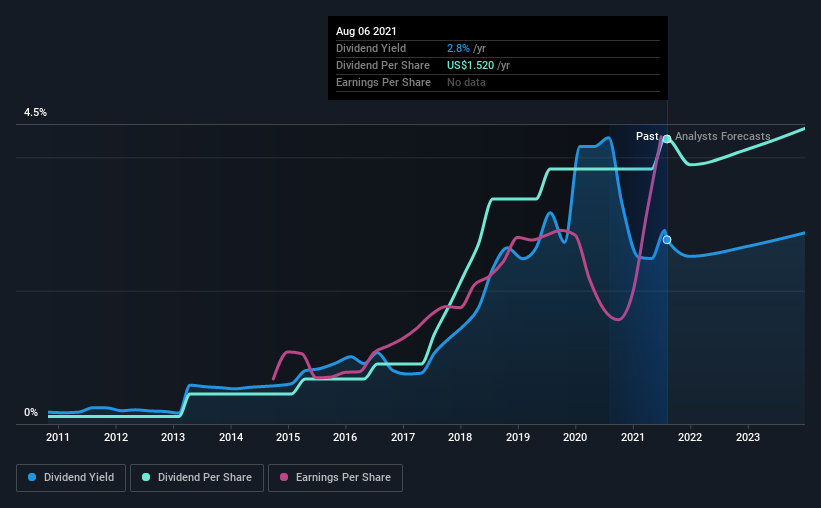Be Sure To Check Out Zions Bancorporation, National Association (NASDAQ:ZION) Before It Goes Ex-Dividend
Some investors rely on dividends for growing their wealth, and if you're one of those dividend sleuths, you might be intrigued to know that Zions Bancorporation, National Association (NASDAQ:ZION) is about to go ex-dividend in just three days. The ex-dividend date is one business day before the record date, which is the cut-off date for shareholders to be present on the company's books to be eligible for a dividend payment. The ex-dividend date is an important date to be aware of as any purchase of the stock made on or after this date might mean a late settlement that doesn't show on the record date. Accordingly, Zions Bancorporation National Association investors that purchase the stock on or after the 11th of August will not receive the dividend, which will be paid on the 19th of August.
The company's next dividend payment will be US$0.38 per share, on the back of last year when the company paid a total of US$1.52 to shareholders. Based on the last year's worth of payments, Zions Bancorporation National Association stock has a trailing yield of around 2.8% on the current share price of $54.99. If you buy this business for its dividend, you should have an idea of whether Zions Bancorporation National Association's dividend is reliable and sustainable. As a result, readers should always check whether Zions Bancorporation National Association has been able to grow its dividends, or if the dividend might be cut.
See our latest analysis for Zions Bancorporation National Association
Dividends are typically paid from company earnings. If a company pays more in dividends than it earned in profit, then the dividend could be unsustainable. Zions Bancorporation National Association has a low and conservative payout ratio of just 20% of its income after tax.
Generally speaking, the lower a company's payout ratios, the more resilient its dividend usually is.
Click here to see the company's payout ratio, plus analyst estimates of its future dividends.
Have Earnings And Dividends Been Growing?
Companies with consistently growing earnings per share generally make the best dividend stocks, as they usually find it easier to grow dividends per share. If earnings decline and the company is forced to cut its dividend, investors could watch the value of their investment go up in smoke. That's why it's comforting to see Zions Bancorporation National Association's earnings have been skyrocketing, up 41% per annum for the past five years.
Many investors will assess a company's dividend performance by evaluating how much the dividend payments have changed over time. Zions Bancorporation National Association has delivered an average of 44% per year annual increase in its dividend, based on the past 10 years of dividend payments. It's great to see earnings per share growing rapidly over several years, and dividends per share growing right along with it.
To Sum It Up
Has Zions Bancorporation National Association got what it takes to maintain its dividend payments? When companies are growing rapidly and retaining a majority of the profits within the business, it's usually a sign that reinvesting earnings creates more value than paying dividends to shareholders. This is one of the most attractive investment combinations under this analysis, as it can create substantial value for investors over the long run. We think this is a pretty attractive combination, and would be interested in investigating Zions Bancorporation National Association more closely.
In light of that, while Zions Bancorporation National Association has an appealing dividend, it's worth knowing the risks involved with this stock. For example, we've found 2 warning signs for Zions Bancorporation National Association (1 is a bit concerning!) that deserve your attention before investing in the shares.
We wouldn't recommend just buying the first dividend stock you see, though. Here's a list of interesting dividend stocks with a greater than 2% yield and an upcoming dividend.
This article by Simply Wall St is general in nature. It does not constitute a recommendation to buy or sell any stock, and does not take account of your objectives, or your financial situation. We aim to bring you long-term focused analysis driven by fundamental data. Note that our analysis may not factor in the latest price-sensitive company announcements or qualitative material. Simply Wall St has no position in any stocks mentioned.
Have feedback on this article? Concerned about the content? Get in touch with us directly. Alternatively, email editorial-team (at) simplywallst.com.

